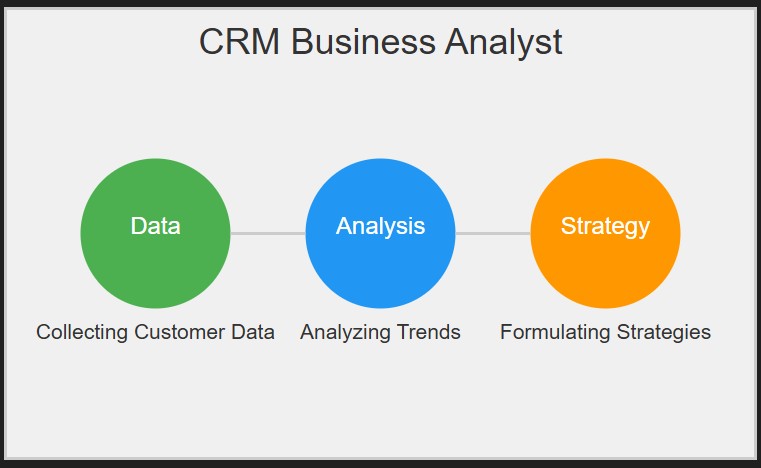In today’s highly competitive digital landscape, businesses are increasingly focused on understanding, retaining, and serving their customers more effectively. At the heart of this transformation lies the CRM Business Analyst—a unique professional who bridges the gap between technical CRM platforms and strategic business objectives.
This article explores the role, skills, responsibilities, tools, challenges, and future outlook of a CRM Business Analyst, providing a comprehensive overview of why this role is indispensable in modern organizations.
Table of Contents
🔍 What Is a CRM Business Analyst?
A CRM Business Analyst (Customer Relationship Management Business Analyst) is a professional who evaluates business needs and translates them into technical CRM solutions that enhance customer relationships, improve sales processes, and boost overall company performance.
Unlike traditional analysts who work in silos, CRM Business Analysts combine knowledge from business strategy, marketing, data analytics, and IT systems. They act as intermediaries between business stakeholders and CRM developers, ensuring that CRM systems (like Salesforce, Microsoft Dynamics, HubSpot, etc.) meet the unique needs of the organization.
💼 Key Responsibilities of a CRM Business Analyst
The responsibilities of a CRM Business Analyst span across departments and workflows. Some core responsibilities include:
-
Requirement Gathering
-
Collaborate with sales, marketing, and customer support teams to gather CRM-related needs.
-
Conduct interviews and workshops to understand pain points and opportunities.
-
-
CRM System Evaluation and Selection
-
Analyze existing CRM systems.
-
Recommend upgrades or new CRM platforms based on scalability, functionality, and ROI.
-
-
Process Mapping and Optimization
-
Document existing workflows related to customer management.
-
Propose improvements using CRM automation, triggers, segmentation, and data analytics.
-
-
System Configuration and Customization
-
Work with CRM developers or admins to tailor the system.
-
Define custom fields, entities, dashboards, workflows, and integrations.
-
-
Data Analysis and Reporting
-
Analyze customer behavior and sales data.
-
Build dashboards and reports to track KPIs and metrics like conversion rate, CLV, churn, etc.
-
-
Training and Support
-
Conduct CRM onboarding for new team members.
-
Create documentation and offer ongoing support for system users.
-
-
Stakeholder Communication
-
Serve as a liaison between non-technical stakeholders and technical teams.
-
Translate business requirements into actionable CRM configurations.
-
🧠 Skills Required for a CRM Business Analyst
To succeed in this dynamic role, a CRM Business Analyst must possess a hybrid skillset that combines technical acumen, business intelligence, and interpersonal skills.
Technical Skills:
-
CRM Platforms: Proficiency in tools like Salesforce, Zoho CRM, HubSpot, Microsoft Dynamics 365.
-
Data Analysis: Excel, SQL, Power BI, Tableau.
-
Integration Tools: Zapier, MuleSoft, REST APIs.
-
Process Modeling: BPMN, Lucidchart, Visio.
Business & Soft Skills:
-
Strong communication and presentation abilities.
-
Analytical thinking and problem-solving.
-
Project management and Agile methodologies.
-
Understanding of marketing, sales, and customer service operations.
🛠️ Common CRM Tools Used
A CRM Business Analyst often works with a variety of tools to perform tasks effectively:
| Tool | Purpose |
|---|---|
| Salesforce | Leading CRM platform |
| Microsoft Dynamics 365 | Enterprise CRM and ERP |
| HubSpot | Marketing & sales automation |
| Zoho CRM | Cost-effective CRM solution |
| Power BI / Tableau | Data visualization |
| Jira / Trello | Project and task management |
| Zapier | Integrations and automation |
| SQL / BigQuery | Data querying |
📊 CRM Business Analyst vs. Other Roles
| Role | Focus | Difference |
|---|---|---|
| CRM Admin | System maintenance | More technical, less strategic |
| Data Analyst | Pure data insight | Doesn’t handle CRM-specific processes |
| Business Analyst | Broader business view | CRM analyst is more niche |
| Marketing Analyst | Campaigns & channels | CRM BA works across teams |
⚔️ Challenges Faced by CRM Business Analysts
-
Data Silos
Many businesses store customer data across multiple platforms, leading to redundancy and inconsistency. -
User Adoption
Getting teams to use CRM consistently and correctly is an ongoing struggle. -
Changing Requirements
Business needs evolve rapidly; CRM configurations must be agile and adaptable. -
Integration Complexities
Integrating CRM with other tools like ERP, helpdesk, marketing automation, etc., often creates technical challenges. -
Data Privacy & Compliance
Ensuring GDPR, HIPAA, and other compliance standards are met when handling customer data.
📈 The Strategic Value of a CRM Business Analyst
More than just a tech role, the CRM Business Analyst adds strategic value to the organization by:
-
Improving Sales Efficiency
Through automation and pipeline optimization. -
Enhancing Customer Experience
By enabling personalization and timely follow-ups. -
Increasing Revenue
Through better lead tracking, segmentation, and customer insights. -
Reducing Operational Costs
By streamlining processes and eliminating manual tasks.
🌍 Industry Applications
The role of a CRM Business Analyst is industry-agnostic, meaning it’s valuable across various sectors:
-
Retail: Tracking customer loyalty and personalizing offers.
-
Healthcare: Managing patient communications and follow-ups.
-
Finance: Customer onboarding and portfolio tracking.
-
Education: Managing student lifecycles and outreach.
-
B2B SaaS: Improving churn metrics and upselling.
🧩 How to Become a CRM Business Analyst
Education:
-
Bachelor’s in Business Administration, Information Systems, Marketing, or Computer Science.
-
Certifications in Salesforce, Microsoft Dynamics, or HubSpot are highly valued.
Certifications:
-
Salesforce Certified Administrator / Business Analyst
-
HubSpot CRM Certification
-
CBAP (Certified Business Analysis Professional)
Experience:
-
Start in sales, marketing, or customer service roles.
-
Transition to CRM configuration or support.
-
Develop reporting and data analysis skills.
🚀 Future of CRM Business Analysis
With the rise of AI, automation, and big data, CRM Business Analysts will take on even more critical responsibilities:
-
Implementing AI-driven personalization.
-
Managing customer data platforms (CDPs).
-
Aligning CRM with omnichannel strategies.
-
Building real-time analytics dashboards.
In the era of customer-centricity, the CRM Business Analyst is evolving from a back-office tech role into a frontline digital strategist.
✅ Conclusion
The CRM Business Analyst plays a vital role in aligning customer-focused technology with business goals. In a world where customer experience defines brand success, this hybrid professional ensures that CRM systems deliver measurable value, actionable insights, and seamless processes.
Whether you’re a company looking to improve CRM performance or a professional aiming to enter a dynamic and future-proof career path, investing in CRM Business Analysis is a move toward growth, retention, and digital mastery.




